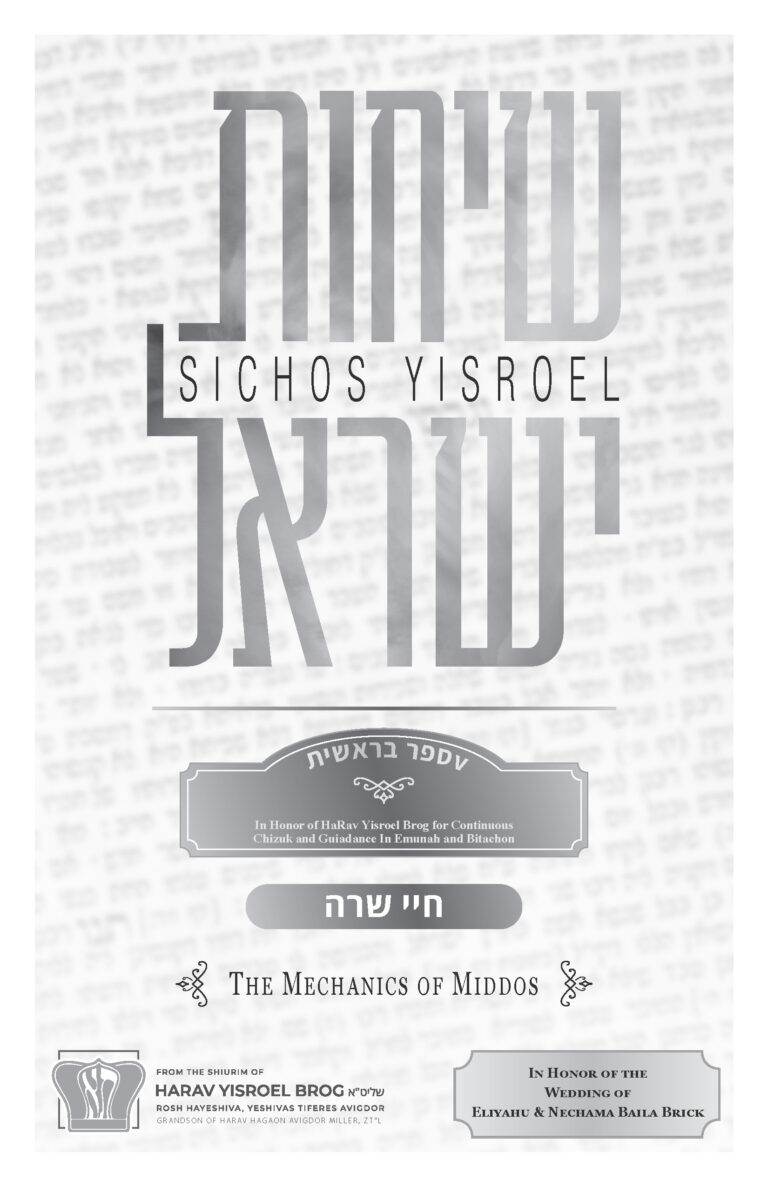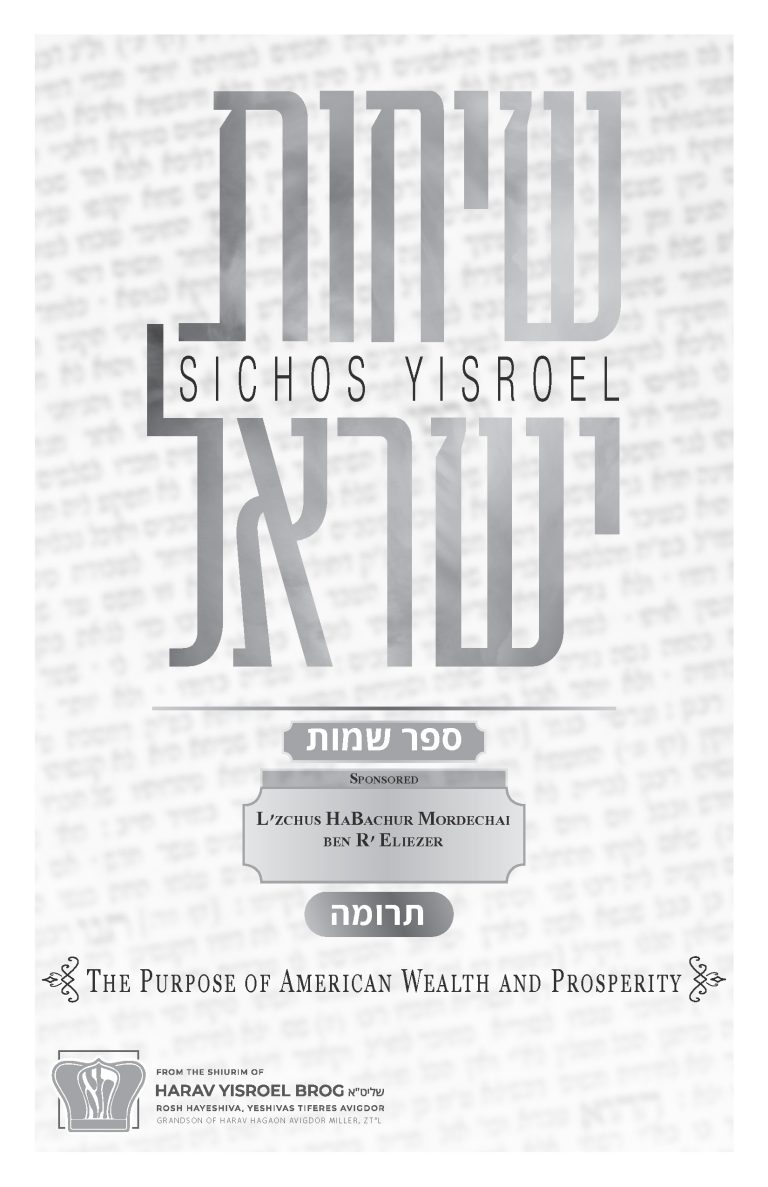Emor 5783: Learning to Honor Your Fellow Jew
Sponsored
לעילוי יצחק מאיר בן לב בלוי
Consider sponsoring a shiur
Visit YTATorah.org
Shiur presented in 5779
The Loss of Rabbi Akiva’s Talmidim
The gemara Yevamos (62b) tells us about the 12,000 pairs of talmidim that Rabbi Akiva had.[i] They didn’t learn in one building. They were spread out from a place called Gabos until Antifras – a network of yeshivos under Rabbi Akiva’s leadership. To imagine such a yeshivah is unbelievable.
My nephew (Rav Sholom Ber Sorotzkin) in Eretz Yisrael has what he claims is the biggest reshes of kollelim and yeshivos in Eretz Yisrael (Ateres Shlomo). It goes across Eretz Yisrael, and has around three and a half thousand talmidim. It’s taka mind blowing. And Rabbi Akiva had 24,000 talmidim! And they all died in a very, very short time, between Pesach and Shavuos. That loss is simply unimaginable. How many Lakewoods would that be? And the world was shamem (desolate) of Torah! The gemara (ibid) says that reason for that was because שֶׁלֹּא נָהֲגוּ כָּבוֹד זֶה לָזֶה – they did not respect each other. And you could imagine Rabbi Akiva under such conditions. If he would have “lost it” – if he would have lost his mind and walked around in a mindless state – it wouldn’t have been any chiddush to us.
Now, the gemara (Bava Metzia 84a) tells us that there was once a tremendous talmid chacham, R’ Yochanan who had a talmid muvhak, Reish Lakish, who was also his brother-in-law. And when his talmid muvhak died, he was completely gone. R’ Yochanan had lots of talmidim. R’ Yochanan experienced tremendous tzaros in his life. He lost ten sons, giants, and he used to carry around the remains of his last son in his pocket. There is a shaaleh what it was. Was it a nail, was it a bone, was it a tooth? And when he met somebody who was down, he would comfort him. But when he lost his one talmid, Reish Lakish, the gemara says that he lost his mind! After Reish Lakish died, R’ Yochanan was wandering in the streets, asking: היכא את בר לקישא היכא את בר לקישא, where are you, Bar Lakisha? And finally, the chachamim had to daven that R’ Yochanan should die. It’s mind boggling.
So Rabbi Akiva loses 24,000 talmidim. Amazingly, he moved to the south of Eretz Yisrael and he started over again. He began with five talmidim: R’ Meir, R’ Yehudah, R’ Yosi, R’ Shimon and R’ Elazar ben Shamua. Through these five, they restored the entire Torah sheba’al peh, the entire Torah of Rabbi Akiva, the entire mesorah of Rabbi Akiva, which is vast. They restored it. These were tana’im. We have no musag what Rabbi Akiva was, or what his talmidim were.
There is another gemara that gives you an idea of Rabbi Akiva’s greatness. The gemara in Chagiga (14b) tells us that there were four people – great talmidei chachamim, who decided to utilize the name of Hashem to travel into shamayim. The gemara says, ארבעה נכנסו בפרדס, four entered the orchard.[ii] This concept is generally referred to as “going behind the curtain.” There is a show – there is in front of the curtain and there is behind the curtain. They went behind the curtain. Rashi explains that these four talmidei chachamim עלו לרקיע על ידי שם – they went up to Shamayim through pronouncing the Name. Who were they? Giants. Ben Azai, Ben Zomah, Acher and Rabbi Akiva. Ben Azai soared to shamayim, he took a look at what was going on and he died. He didn’t make it back. Ben Zomah looked at what was going on and he became wounded, nifgah. Acher – who was the rebbi of R’ Meir – his mind got so messed up, and he went off the derech. נְפַק אַחֵר לְתַרְבּוּת רָעָה – he went astray. You learn one lesson from here. Don’t rush to go to shamayim. Wait your turn. You’re going to have a turn. Everybody has a turn. You just hope, when your turn comes, they push the button in the elevator for going up instead for going down. But it’s not advisable to go before your time. And it says, the malachei hashares are not “tickled pink” when they see guests. They don’t like people, בְּנֵי אָדָם קְרוּצֵי חֹמֶר – the sons of man molded from matter, in other words, mortals coming and playing in their fields. So when Rabbi Akiva showed up, בִּקְּשׁוּ מַלְאֲכֵי הַשָּׁרֵת לְדוֹחְפוֹ, the malachei hashares wanted to push him off. אָמַר לָהֶם הַקָּדוֹשׁ בָּרוּךְ הוּא, Hakadosh Baruch Hu said to them, הַנִּיחוּ לְזָקֵן זֶה, leave this old man alone, שֶׁרָאוּי לְהִשְׁתַּמֵּשׁ בִּכְבוֹדִי, for he is fit to serve My Glory. You hear that? Of all the tana’im, he was the only one that Hashem says, “Let him go.” He can play. He can stay with us. The greatest rosh yeshivah in history!
In Slabodka, They Never Said A Bad Word
When we talk about the fact that they were לֹּא נָהֲגוּ כָּבוֹד זֶה לָזֶה, we don’t mean that they were very bad to each other. My zeide (Rav Avigdor Miller, zt”l) was once trying to bring out the level of greatness in the Slabodka yeshivah in pre-war Europe. In the six years before World War II, when the yeshivah wasn’t at its highest – the Alter from Slabodka wasn’t there already. His son-in-law was there and amazingly, there was a big yeshivah going on. My grandfather said, in the six years that he was there, he never once heard the word shlecht – i.e. bad. Could you imagine that?! Could you be masig that?! I can’t masig it. They would never say about someone that he’s a shlechter, he’s a bad man, a bad person, or a bad thing. They would never say shlecht about a mensch over there. They said nisht gut, not good. That’s what they said. They also wouldn’t use the word shaigetz in reference to a goy because shaigetz comes from the word sheketz which is something disgusting, and a goy is also created in the tzelem Elokim. Even though, as the zeide said, they are far from the ideal picture of a tzelem Elokim, they are still made in the tzelem Elokim. They never called them shkotzim. It’s amazing!
Now, if they did this in Slabodka, I can only begin to imagine what the level of conduct was in the yeshivah of Rabbi Akiva among his talmidim who were tana’im! So when it says they weren’t נָהֲגוּ כָּבוֹד זֶה לָזֶה, you understand that it must have been something very, very slight.
Hashem Cares When We Treat People With Respect
A person has to know that Hakadosh Baruch Hu does care how people relate to each other. You have to know that. Hakadosh Baruch Hu does care how people relate to each other.
Unfortunately, today, there is a minhag among some yeshivah bachurim that has been picked up from the street. It’s a terrible minhag. They like to bang each other on the back because they are brothers. Bam! They like to come behind another guy and put their knee behind his legs if he’s standing straight, trying to give a jolt to make him think he’s falling. They bang one another on their backs. They like to call each other bad names when they hear the goyim call each other. So they call each other goyishe names. Of course, it’s all done in a joking manner. But what it does is that there is no kavod zeh le’zeh. It shows you have no kavod for a Yisroel, you have no kavod for a ben Torah and ultimately, you are not being mechabed Hashem.
How The Chafetz Chaim Treated People
You have to understand that talmidei chachamim and tzaddikim were just amazing when it came to this type of avodah. If you take a look at the sifrei Chofetz Chaim, there is a sefer written by his son. It is called Dugma Midarkei Avi. I remember when I found it, I was extremely excited. Here is a person who grew up in the house of the Chofetz Chaim, and he’s willing to share with you a dugma (an example)of the ways of his father. And he writes like this: בפועל, in actuality, in reality, you know what the Chofetz Chaim’s mind was preoccupied with constantly? Now, the Chofetz Chaim was a masmid. He was a masmid, shpitz masmid. He was kuloi kodesh. And his son said that, בפועל היה דעתו תקוע תמיד בבין אדם לחבירו, his mind was constantly preoccupied with bein adam lachavero. בין בדברים גדולים, whether it was big things, בין בקטני קטנות, whether it was the smallest of things. Could you imagine the Chofetz Chaim being preoccupied with small things?
Putting His Yom Kippur Aside
Listen to a story that we have, baruch Hashem, from the Chofetz Chaim. One year, on one of the holiest nights of the year, the night of Yom Kippur, after the people finished davening, and left the beis medrash, the Chofetz Chaim remained involved in his avodas hakodesh since some lamps were still shining in the beis medrash. Suddenly, the Chofetz Chaim became aware of some noise in the beis medrash. He turned around and he saw Hershele. Hershele was an alter bachur. He was already 60. A real alter bachur. And he was sitting on one of the benches. He was considered a shtikel nebach because he had been looking for a shidduch and couldn’t find one. So the Chofetz Chaim’s rachmanus was moved and the Chofetz Chaim decided to forget about his Yom Kippur. He put his Yom Kippur aside. He didn’t tell the guy to come to him. He walked over to where he was sitting and he sat down next to Hershele, and put his hand on his shoulder, and began to be mechazek him and being me’oded him, giving him encouragement. And the Chofetz Chaim began to tell this Hershele his life story, about the many tzaros he went through from when he was a child. His father died when he was very young. The Chofetz Chaim was subjected to an onslaught by a fellow named Adam Hakohen. (He tried to get the Chofetz Chaim off the derech in his teenage years and every year the Chofetz Chaim gave a shmuess about it. He used to say about him, ‘Adam Hakohen yemach shemo vezichro.’ He spoke lashon hara about this fellow, the rasha merusha who tried to get him off the derech and almost succeeded. He was from the Reform movement and he saw the Chofetz Chaim was a good catch). Chofetz Chaim said that he was forced to get married when he was 17 years old to somebody who was 26. He was sick with heart problems. So he started telling all his stories. His poverty, this and that. And he said, “Listen, you see, baruch Hashem, things turned out okay.” He spent the entire night talking to him on Yom Kippur night. It’s amazing that the Chofetz Chaim should have a bull session with a guy to be me’oded him. He could have told him “Come back after Yom Kippur, I’m busy now.” But he didn’t. This was the avodah of his Yom Kippur. This was the kavod he had for a pashute bachur, not a talmid chacham.
R’ Leib, the Chofetz Chaim’s son, writes in his sefer that there was another year, on the night of Yom Kippur, that the Chofetz Chaim called together all the older bachurim who weren’t yet married and he was me’orer them, and mezarez them to be mishtadel to try to find their zivug this year. And he bentched them on the night of Yom Kippur. This is called being concerned about others in such a tremendous way. It’s mind boggling!
Rav Yisrael’s View
There is a famous story with R’ Yisrael Salanter (1809-1883). He turned to somebody on Yom Kippur. The guy looked like he was really into it. R’ Yisrael Salanter turned to the fellow and he asked, “What’s the time now? Vos is de zeiger?” The guy ignored him. He was ‘flying’ in shamayim, you understand. R’ Yisrael said to him, “Because you’re motivated and moved because of pachad Yom Hadin, I’m at fault? I have to suffer? Adaraba, the more you go up in your madreigos on this holy day, you should double and triple your kepeida, your zehirus, in the kavod chaveirecha, in the kavod of somebody else.” Unbelievable!
The Tchebiner Rav’s Derech
There are a lot of tzaddikim like this. There’s a mind boggling, amazing ma’aseh with the Tchebiner Rav, R’ Dov Berish Weidenfeld (1881-1965) who came from the city of Tchebin (Poland) to Eretz Yisrael. He was a masmid niflah she’ein kamoso. I mean, he was a heilige yid, a talmid chacham muflag. He was zocheh to tremendous kavod, tremendous haracha. He lived in Shaarei Chesed in Yerushalayim. One Yom Kippur night, he was coming home from the beis medrash and he passed the central beis haknesses. It was called Khal Chassidim. Sitting there were some Holocaust survivors, some nebachs who went through the tzaros of the Holocaust and they were singing marches, European marches from Europe. Alter niggunim that they used to sing in the home, in chutz la’aretz.
The Tchebiner Rav himself was a Holocaust survivor. He lost most of his family and his city in the war. He understood what they were going through, so he decided, instead of going home, he is going to stop in and keep them company. I’ve seen pictures of the Tchebiner Rav, shuffling along. He went into the shul and spent a very long time with them, singing with them, and reviewing history. A while later, there was another major talmid chacham who lived in Shaarei Chesed who was going home. Who was that? None other than R’ Shlomo Zalman Auerbach (1910-1995). He used to talk a lot in learning and he asked shaalos to the Tchebiner Rav. And he knew that he was one of the older ge’onei hador. R’ Shlomo Zalman Auerbach opens the shul doors. He hears people singing. You don’t make tischen Yom Kippur by night. He opens the door and who does he see? A por alter zekeinim, not exactly groise chassidishe rebbes and who is sitting with them? The Tchebiner Rav einer alein (himself)! And this giant is sitting among them and he is singing marches with them! R’ Shlomo Zalman was blown away.
Now, R’ Shlomo Zalman had a minhag that every motzai Yom Kippur, he would come to the Tchebiner Rav to ask him for a brachah for a gut yahr. So he came to him and he said to him, “Yelamdeinu Rabbeinu. I have a shaaleh,” he said. “What was the Tchebiner Rav looking for in that shul, in the chevrah of these people? I know time is very valuable to you and the night of yom hakadosh, why is this the chevrah you’re looking for?” So Tchebiner Rav said, “If you already asked, I’m going to answer you. Last night, on the way home, I had a plan. I had a very exact plan of what I was going to do when I got home. What was that? I was going to learn the entire meseches Yuma, the entire mesechta in one night. (You should know that he was a gaon. 90 blatt in just one night! Until the morning!) But when I passed in front of the shul, I heard the voices of these people who were saved from the Holocaust and I understood they were tzubrochene mentschen. And they were warming themselves up by singing niggunim and marches so I thought to myself the following shaaleh. ‘What is going to cause Hakadosh Baruch Hu more nachas ruach? Does He prefer me to be mesayem the whole meseches Yuma tonight, or maybe I should sit with these tzubrochene people and be mesamei’ach them?’ And I concluded that vadai Hakadosh Baruch Hu is going to be happier if I sit with these tzubrochene menschen. And this is what I did. That was my avodas hayom.” It’s a mind-boggling ma’aseh.
When R’ Shlomo Zalman said over this ma’aseh, he said that he had a tremendous chalishas hadaas from this story. He said, “I always thought that I’m mishtadel to do what Hakadosh Baruch Hu wants from me. That’s what I thought. And still and all, how come I’m so far away from the Tchebiner Rav, the gaon of Tchebin? But when I saw his middos, aza ma’aseh, then I understood where he gets his siyata deshmaya to shteig ois unbelievably bemaalos hatorah.” It’s l’lo gevul, it’s beyond, it’s unreal.
We see how these gaonim respected others. They were noheig kavod zeh lezeh. They were noheig kavod to pshutei am, to simple people. And to each other? Kol shekein, for sure. What’s there to talk about?
But today, somebody comes in and what do we do? It’s a new joke. You want to be mesamei’ach elokim ve’anashim so a guy comes into the shul, he looks a little bit like an ish pashut, so now you have who to make fun of a little bit. Make mesamei’ach.
Rav Shmuel’s Yedid
R’ Shmuel Rozovsky (1913-1979) was a king. He was a very classy, regal personality. A gaon, a lamdan. The Brisker Rav (1886-1959) had a tremendous kavod for him. His rebbe, R’ Shimon Shkop (1860-1939) was zocheh to be maamid amazing talmidim, who impacted the world of Torah in a way that few others were zocheh. After every shiur R’ Shmuel gave in Ponevezh, tons of talmidim came around him and they jumped on him with shaalos, questions. R’ Shmuel would walk and they would walk with him. One time, they were walking in the yeshivah and suddenly, they saw the cleaner from the yeshivah, an alter Russian yid, named Avremele, pushing his pail and mop trying to make his way into the group. He said, ”Ich vill gein to the rebbe.” He wanted to come to the rebbe, R’ Shmuel. He comes to R’ Shmuel and he starts to tell R’ Shmuel that he’s having a lot of tzaros. R’ Shmuel says, “Vos iz?” So he says, “I’m living in a freier neighborhood and my neighbors are mechalel Shabbos befarhesia, and it bothers and disturbs my menuchas Shabbos to no end.” And he said to R’ Shmuel, “Ven ich hob gevein a yungerer russier, when I was a young person in Russia, we were careful with shemiras Shabbos bemesiras nefesh and now, in my old age, when I come to Eretz Yisrael and shemiras Shabbos is supposed to be self-understood, min hashamayim I have to deal with aza gezeirah to be sovel, to tolerate the noise of chilul Shabbos?!” He said, “Rebbe, efsher ken men helfen, maybe you can help me to get out of my tzaros?”
R’ Shmuel tried to put him in a good mood, to tell him a cute vertel, but he wasn’t taking it. He wasn’t calming down. And he told R’ Shmuel like this, “If the inyan is not going to be taken care of, I’m going to be forced to go back to Russia.” Then Russia and the Iron Curtain hadn’t come down yet. The Iron Curtain was still up. They all laughed. All the bachurim smiled from the threat and R’ Shmuel smiled too and he said, “R’ Avraham, before you go back to Russia, make sure you stop by and tell us shalom and tell us goodbye.” That was the end of the story. A lot of bachurim saw this and the story was over. No one thought there was going to be any continuation to this story. No one even had a thought that anything was going to come out of that talk. But a number of days went by and the bachurim found out that they were very, very mistaken.
From the minute R’ Shmuel got home, he got on the phone. And he said, “There is a yid who is uncomfortable because of chilul Shabbos.” What do I care what his job is? So he’s the cleaner in Ponevezh. “You’ve got to help him.” He picked up the telephone. He called somebody who he knew who worked in the Department of Housing, misrad hashikun and he had good relations with him. He told the guy that he has a good friend, a good yedid, they work together, and he’s suffering from his neighbors. There are freier neighbors in his neighborhood. “Please, we have to find him another neighborhood, a frum neighborhood to live in. We have to find him a place.” The guy said to himself, “Listen, he’s a good friend of R’ Shmuel and he works with him together in Ponevezh, nu, it must be someone special!” So within a number of days, the inyan was mesuder. He got him a different dira. Not only that, but the guy sent his grandson to help with the move from one apartment to the next!
This is how the gedolim had respect for every person. This is how they expressed their respect for others in practical terms.
Opportunities For Respecting People
Rabosai, you have to know that this is what the Ribono Shel Olam wants from us. And if the Ribono Shel Olam wants this from us, this is something we have to deliver. You say you can’t finish Yuma in a whole night? Okay, maybe. But to treat each other with kavod, to treat pshutei am with kavod, to go out of your way to do for people and you’re not going to get kavod for this. When you sit in the beis medrash on Yom Kippur night and you’re singing with somebody, you’re not going to get any kavod from this. No picture is going to be taken. And those people are not going to chap that you’re doing anything big. You help a poor yid move from dira A to dira B, no one is going to look at you. But that is what Hakadosh Baruch Hu wants from you.
I had a story this year. An alter bachur, a 55-year-old person had a stroke erev Yom Kippur. He called me up erev Yom Kippur, he wasn’t talking clearly, and he told me what happened. “So where are you? I’m going to come over right away.” I went down to the hospital and there was a balabos who called me up. He said, “Are you in the hospital? Get out of the hospital. You don’t belong in the hospital erev Yom Kippur.” He said, “You have to be in the yeshivah, be with the family. Don’t stay in the hospital.” I said, “This is my avodas hayom. If I have to, I’ll stay Yom Kippur also.” Baruch Hashem, we had a talmid who was willing to stay with him. That was a terrible stay for those hours, because he was in an emergency room in the old hospital that had no windows in it. It was a daled al daled. It was very hot. I was mamash getting claustrophobic. I walked out a couple of times, but I saw that the fellow was struggling with eating. He told me, “I don’t need your help.” “Just let me help you a little bit.” “I don’t need your help.” He’s the kind of guy who likes to be independent. He started eating his soup and the soup ended on the floor. And then he ended up on the floor. I said, “Now you can let me help you a little bit?” He said, “A little bit.” I said, “I’m not going to do it for you. I’m just going to lean the plate on my hand. Hold your own body like this.” And then the talmid stayed with him. Did the talmid miss Yom Kippur? He said, no. He chapped arein Yom Kippur. Not only that. He had a double mitzvah because on motzai Yom Kippur, the man didn’t want to let him leave. By that time, I was platzing already, just thinking about being stuck in that place. The bachur stayed there for two days with that man, without walking out of that place. I am going to tell you something: he had the best Yom Kippur, more than a lot of yidden! That is the Yom Kippur Hakadosh Baruch Hu wants from a person.
We should all learn from that. And now it’s history, but not for him, because he was zocheh to be koneh a treasure, by being mechabed somebody whom he didn’t know. And the sick person told me, mamash he was mechayeh meisim!
Hakadosh Baruch Hu should help us, when we see these opportunities, that we should chap them and we should utilize them.
The Bottom Line
When we ponder the unimaginable loss of the 24,000 talmidim of Rabbi Akiva – one of the most tragic events in our history, one that almost ended the oral Torah tradition – we are reminded of the Chazal that identified the root of that tragedy, שֶׁלֹּא נָהֲגוּ כָּבוֹד זֶה לָזֶה. Those talmidim were all tannaim and represented the power of the Torah for the millennia (they were the “fathers” of the Oral Torah, because Rabbi Akiva was the transmitter of that Torah), and they were held to a much higher standard than any subsequent generation. But still and all, the most basic lesson for us to learn from this tragedy, is that Hakodosh Boruch Hu cares how we relate to and treat each other. The stories of tzaddikim – of how the Chofetz Chaim put his own Yom Kippur to one side in order to give chizuk to an alter bochur, Heshele, throughout the night, or how the Tchebiner Rav sang old marches with Holocaust survivors on Yom Kippur night, instead of his prior plans to finish the entire meseches Yuma, or how Rav Rozovsky arranged a new apartment for a janitor from the Ponivezh Yeshiva – should inspire us to change how we relate to and care about other people. This coming week, if I see a yid whom I don’t know well, or even a complete stranger – whether in my shul, my yeshiva, or my office – I will go out of my “comfort zone” to do something for him, to help him, to treat him with kavod. If I am in a yeshiva, I will be mechabed a younger bochur with a kind word, or a “good morning” with a smile. And in in the zechus of going the extra mile by thinking and caring about another yid during these remaining days of the Sefirah – while remembering the consequences of שֶׁלֹּא נָהֲגוּ כָּבוֹד זֶה לָזֶה – I will fulfill Hashem’s ratzon and will, IY”H, have the most uplifting Shavuos of my life!
[i] אָמְרוּ: שְׁנֵים עָשָׂר אָלֶף זוּגִים תַּלְמִידִים הָיוּ לוֹ לְרַבִּי עֲקִיבָא מִגְּבָת עַד אַנְטִיפְרַס, וְכוּלָּן מֵתוּ בְּפֶרֶק אֶחָד, מִפְּנֵי שֶׁלֹּא נָהֲגוּ כָּבוֹד זֶה לָזֶה. והיה העולם שמם, עד שבא רבי עקיבא אצל רבותינו שבדרום ושנאה להם: רבי מאיר, ורבי יהודה, ורבי יוסי, ורבי שמעון, ורבי אלעזר בן שמוע, והם הם העמידו תורה אותה שעה.
[ii] תָּנוּ רַבָּנַן: אַרְבָּעָה נִכְנְסוּ בַּפַּרְדֵּס, וְאֵלּוּ הֵן: בֶּן עַזַּאי, וּבֶן זוֹמָא, אַחֵר, וְרַבִּי עֲקִיבָא. אֲמַר לָהֶם רַבִּי עֲקִיבָא: כְּשֶׁאַתֶּם מַגִּיעִין אֵצֶל אַבְנֵי שַׁיִשׁ טָהוֹר, אַל תֹּאמְרוּ ״מַיִם מַיִם״, מִשּׁוּם שֶׁנֶּאֱמַר: ״דּוֹבֵר שְׁקָרִים לֹא יִכּוֹן לְנֶגֶד עֵינָי״. בֶּן עַזַּאי הֵצִיץ וָמֵת, עָלָיו הַכָּתוּב אוֹמֵר: ״יָקָר בְּעֵינֵי ה׳ הַמָּוְתָה לַחֲסִידָיו״. בֶּן זוֹמָא הֵצִיץ וְנִפְגַּע, וְעָלָיו הַכָּתוּב אוֹמֵר: ״דְּבַשׁ מָצָאתָ אֱכוֹל דַּיֶּיךָּ פֶּן תִּשְׂבָּעֶנּוּ וַהֲקֵאתוֹ״. אַחֵר קִיצֵּץ בִּנְטִיעוֹת. רַבִּי עֲקִיבָא יָצָא בְּשָׁלוֹם.






